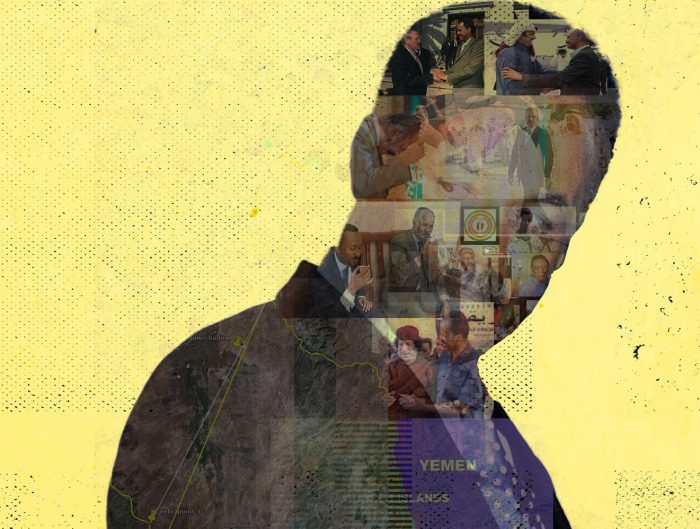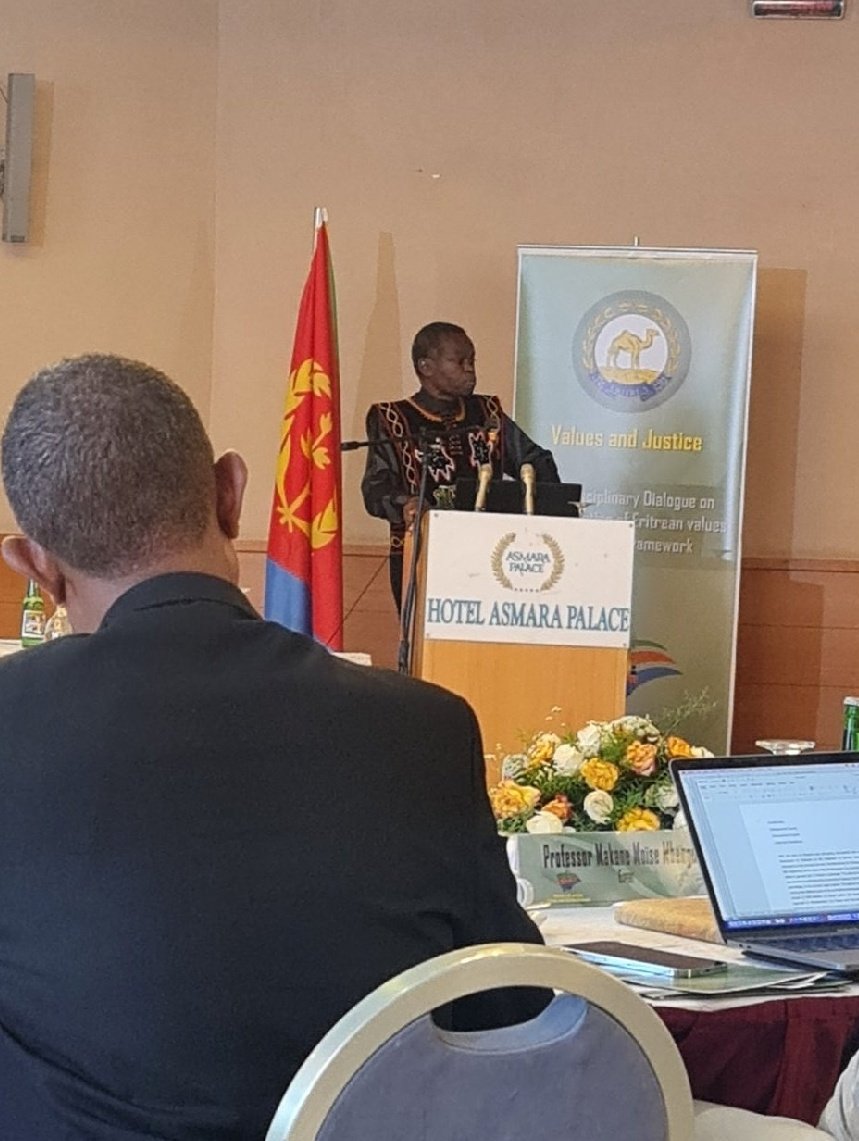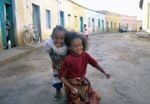This is a translation of a narration in Tigrinya which was made by one of the members of the 26th Round. All errors in translation are that of ED Editor. Special thanks to ED friend AZ for bringing this story to my attention. When you read this story, remember it is that of 17-18 year old Eritrean kids. Then maybe you will understand why underage Eritreans are leaving Eritrea, now, post the peace agreement with Ethiopia: the predator is at home..
I begin by saluting my dear brothers and comrades of the 26th round, all of you who are disbursed all over the world, inside and outside Eritrea. And those of you who have passed on, I wish for your reception in the Creator’s heaven. For as long as I live, you will be in my heart.
Followers of RBL TV Entertainment, how have you been? I am going to narrate the problems and hardships encountered by members of the 25th and 26th round. I know that the military life for some is even worse; but because I can narrate on what I experienced, I kindly invite you to follow what I am about to tell you.
Author: Musael Temesghen
and narrator: Yohannes Ahferom (“Fabrigas”)
In 2012-2013, as is common for all Eritreans, nearly 17,000 Eritreans flocked to Sawa. All youth, including me, were happy to be in Sawa because one gets to meet youth from all Eritrean towns. Sawa taught us many good things: social life, love, egalitarianism without distinction of rich or poor, all living in mutual respect, all living like they came out of one womb. In short, for us who were in the 26th round, Sawa is Love. But the atrocities at Sawa are also uncountable.
Above all, what is most loathsome about Sawa is that you are not able to express how you feel; sometimes you get punished to the point you hate being created That feeling of hopelessness to the point you fail to understand your school lessons; being physically sick with no quick remedy. Sometimes, with regards to some members: you ask, “are they children of man?”
Some of the forms of punishment, from my recollection:
* Collect 500 live ants;
* Bring me 1,000 grains of rock in five minutes;
* Clean an entire bathroom;
* For half an hour, stand barefoot, in the pavement;
* Transfer water from a big container to another: one mouthful at a time;
It is a lot. A lot. I invite you to list it in the comments section.
In any event, the positive side of Sawa is during school. That’s where you declare your independence; get introduced to females; meet your compatriots; console your sisters who have given up on school; visit the ailing; cooperate with classmates. Wow, wow! School time is very, very sweet. You establish good friendships with your classmates. If you get a chance, you visit one another on Sundays. I remember, when we visited the females, they would host us with cookies, date fruits and juices. Similarly, when you visit the male dorms. We had a very good time. Some fell in love, some even got all the way to marriage. For some, it is “Sawa Love Extends To Forto Sawa”: it ends after everyone mounts the truck taking them home.
It’s hard for me to explain Sawa Life. What I have described is just a spoonful from the ocean. And so, school was over and it was time to say goodbye to the females: as if we hadn’t come to despise Sawa and look forward to the end of the semester, when it came time to say goodbye, it was hard: we just couldn’t accept that we who lived as a family were being separated. I didn’t know men could cry but, truly, we all cried: we exchanged phone numbers and we returned to our home towns.
After dispersing from Sawa, some of us, not all, met one another by phone. About two weeks later, we were called to return to our schools at our hometowns to get our grades. I went there. I am not school-smart. And I didn’t get [matriculation exam] passing grades. Upon hearing the results, some were happy, and others were depressed. Less than a month later, before we had time to fully enjoy the company of our families and siblings and neighborhood that we had missed and before a healthy glow had returned to our faces, we were told, “all of you from the 25th and 26th round who did not get passing grades [to attend university] now have an opportunity to attend vocational education at Sawa.” Most of us grudgingly returned; but a few were unwilling to return.
On our second return to Sawa, we were dispersed to four brigades in: Machinery, Agriculture, Commando and Officers. From the beginning, the soldiers would make you wait two hours in the sun just to tell you what to do next. It was all disorienting. For two weeks, all we had was pasta fajioli.
We returned to Sawa to attend vocational education. What met us there was something else. One day, they built stretchers, woke us in the morning and told us to get moving. We were shocked. But given their forked tongue, they told us this is just to get us to move around until school starts; besides, it is a requirement for military training. What is most saddening is that those who had waivers and had physical ailments were forced to move with us. None of the youth were composed. After a few days, they called us out to a meeting. When we went to the meeting, we were addressed by Wedi Memher, a Brigadier General. After giving us his welcome and salutation, he proceeded to give us terrible news: “The long march that was scheduled for the 5th Round will be initiated by you. Beginning tomorrow morning, you will march to Afabet. Everything is easy. Our hope is on you. Victory to the Masses!” he said, adjourned the meeting and leaving us there.
The distress of the time, the cries of the time are a fact witnessed by the youth who were there. This was above the expectation of the youth and they just couldn’t handle it. What is most saddening is that night, many individuals whose whereabouts, whose fate–living or dead– I do not know, left in the direction of wherever their feet took them.
And thus, beginning on Saturday, 12 October 2013 around 5:30 pm until Wednesday 6 November 2013, Round 26 and 25 marched from Sawa to Afabet. A human, I am prone to making errors and if I err, I respectfully ask you to correct me in the comments section.
First, from Sawa to Hawasheit, it is 32 kilometers. This being our first one, it was very hard on us. We traveled with shovels and stretchers. We also carried water but we were not allowed to drink. Many females were fatigued and started tumbling. Boarding cars is not allowed: you had to carry them on a stretcher. Our legs swelled and we had blisters. But what can we do? It is “do as you are told or leave their realm.” When we reached Hawasheit, all were exhausted, but those who were relatively ok started preparing tea, some gathered woods, and some mixed flour with water to make bread.
Early in the morning, before we had enough rest, they woke us up to make the next trek: from Hawasheit to Kerekebet: 42 kilometers. Recalling the fatigue and illness is now very hard for me to explain. Everybody stumbled along, hating being born. Carrying what we had to carry, buttressing what we had to buttress, we arrived at Kerkebet. After assessing our situation, they let us rest for three days in Kerkebet. But Kerkebet was no relief: it left a stain that will never fade for life. Specially in the 4th brigade, 2nd battalion, 1st company, it took the lives of two youth. And this is how:
Kerekebt has a big lake, 17 kilometer in diameter. Because they allowed us to swim in it, everyone, whether they could swim or not, started swimming. To tell the truth, all of us were pleased because it was a relief from our fatigue. Those of us who couldn’t swim stood waist-deep with the females; and those who could were diving from higher ground and summersaulting. Meanwhile, because it was Eid Al Fater, a youth (I will withhold his name) called his family to say “Eid Mubarek” had a great conversation with them and went swimming but because he couldn’t swim, they found he had drowned and rushed him to the brigade clinic. We were all sad. We were shocked. We screamed. But those who were escorting us said, “Hurry up: ten of you, get a shovel and get moving: your comrade has been martyred.”
Death has become trivial. Ten of us, and our shovels, were taken in a car. At a small village, we dug a burial place but before we could finish digging, we were ordered to dig a second one. We were very shocked. What is this? You die and get buried in a wasteland? That’s it? The second burial site is also for a member of the 25th Round, whose name I will also withhold. We dug both holes. We covered them with the shroud they had given us to shield us from the cold. We, who don’t even amount to 20 individuals, buried them. And returned back to join our units.
Part two continues
Editor: Here’s what the government of Eritrea had to say about the 26th round. And here’s their graduation.





Leave A Reply